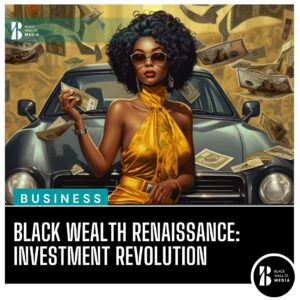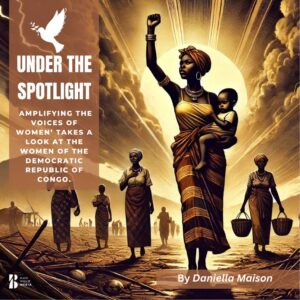BUSINESS
The rise of the Black investor class is transforming the economic landscape, as Black investment groups, venture capital firms, and individual investors are pushing Black business forward.
“With a renewed focus on financial literacy, entrepreneurship, and wealth creation, Black men and women are seizing opportunities, educating themselves, and making significant strides in the investment world.”
Black Wall St. MediaContributor

Black Wealth Renaissance: Investment Revolution
In recent years, the rise of Black investment groups, venture capital firms, and individual investors has been nothing short of remarkable.
Black men and women have taken advantage of the COVID-19 pandemic to educate themselves about money, invest in businesses, and even acquire real estate.
This surge in Black entrepreneurship and ownership has been fueled by the Black Lives Matter movement and the increasing focus on racial equity, with notable advancements celebrated on Juneteenth.
One of the most significant shifts observed in this period is the integration of financial literacy into popular culture.
As entrepreneur, investor, and podcaster David Shands pointed out, rappers and musicians are now incorporating messages of financial literacy into their music, making it cool and relatable.
This cultural transformation emphasizes the importance of being financially responsible and knowledgeable, which is essential for building wealth and economic empowerment in the Black community.
While the recent rise in Black investment is impressive, it’s worth noting that some Black individuals had already amassed fortunes through investments in the 1980s, 1990s, and early 2000s.
One notable example is Herman J. Russell, a Black CEO and investor who left an indelible mark on the Atlanta skyline.
Russell started with a vacant lot he purchased in 1946 and went on to build H.J. Russell & Co., one of the largest black-owned construction and real estate firms in the United States.
His projects include iconic landmarks such as Hartsfield-Jackson Atlanta International Airport, the Georgia Dome, Philips Arena, Turner Field, and Mercedes-Benz Stadium.
Russell’s success serves as a testament to the power of persistence, promptness, and reliability, which he considered crucial for success in an industry with little minority participation.
Reginald Lewis, the late CEO of TLC Beatrice, was another trailblazer who shattered barriers.
As the first Black man to build a billion-dollar company, Lewis demonstrated the potential for Black entrepreneurs to access public capital and leverage it for deal-making.
His investment firm, the TLC Group, acquired Beatrice International Foods Cos. in 1987, which had a widespread presence in the food industry globally.
Lewis’s accomplishments also extended beyond business, as he played a significant role in facilitating access to financing for Black Americans on Wall Street.
His legacy lives on through his wife, Loida Lewis, who successfully continued running TLC Beatrice, generating over $3 billion in net sales in the first two years of her leadership.
Throughout the 1990s, other Black businessmen, like FUBU CEO Daymond John, contributed to the advancement of Black investment.
John’s journey began by selling hats outside the Apollo Theatre, and he has since become a prominent investor featured on NBC’s “Shark Tank,” providing support to numerous businesses.
Similarly, Robert F. Smith, the CEO of Vista Equity Partners, gained national attention when he generously paid off the tuition and student loans of the Morehouse College graduating class in 2019. Smith’s investment portfolio boasts over $96 billion in assets, supporting technology-enabled companies worldwide.
Beyond these individual successes, a growing chorus of figures and organizations is actively working to make investing more accessible and promote financial literacy among Black men and women.
Black athletes and celebrities, including Serena Williams, Kevin Durant, Stephen Curry, Jay-Z, and Snoop Dogg, have started their own venture capital funds, investing in and supporting minority- and women-led businesses. Serena Ventures, for instance, has made multiple investments in women-owned and minority-owned businesses, fostering economic growth and inclusivity.
Wall Street veteran and finance coach Shareef “Ross Mac” McDonald aptly describes the renewed interest and dedication of Black individuals toward wealth creation as the “Digital Civil Rights Movement.”
In the wake of events like the murder of George Floyd and the challenges posed by the COVID-19 pandemic, Black communities have become increasingly intentional about pursuing knowledge and wealth independently.
With the democratization of information and the accessibility of stock market investments, Black content creators on platforms like Twitter, Instagram, and YouTube are actively encouraging their communities to seize the opportunity to buy stocks at affordable prices.

Black Investors Driving Change
This digital Black wealth renaissance reflects a powerful shift in mindset and a determination to overcome historical barriers.
The rise of the Black investor class signifies a profound transformation in the economic landscape.
Black investment groups, venture capital firms, and individual investors are not only pushing Black businesses forward but also advocating for financial literacy, equity, and entrepreneurship within the community.
By building wealth and supporting minority-owned enterprises, these investors are creating a more inclusive economy that paves the way for future generations.

Black Investors Driving Change
The legacy of pioneering Black investors and the continued efforts of today’s trailblazers ensure that the path to economic empowerment is becoming more accessible, fostering a brighter future for Black entrepreneurs and investors alike.
Black Wall St. MediaContributor













